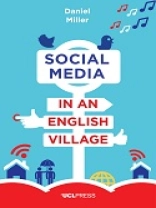Daniel Miller spent 18 months undertaking an ethnographic study with the residents of an English village, tracking their use of the different social media platforms. Following his study, he argues that a focus on platforms such as Facebook, Twitter and Instagram does little to explain what we post on social media. Instead, the key to understanding how people in an English village use social media is to appreciate just how ‘English’ their usage has become. He introduces the ‘Goldilocks Strategy’: how villagers use social media to calibrate precise levels of interaction ensuring that each relationship is neither too cold nor too hot, but ‘just right’.
He explores the consequences of social media for groups ranging from schoolchildren through to the patients of a hospice, and he compares these connections to more traditional forms of association such as the church and the neighbourhood. Above all, Miller finds an extraordinary clash between new social media that bridges the private and the public domains, and an English sensibility that is all about keeping these two domains separate.
Praise for Social Media in an English Village
‘The book has definitely lived up to my expectations and changed the way I think about social media. … a truly illuminating and recommendable [reading] experience.’
New Horizons in English Studies
‘This fine study is located in anthropology, and there will therefore be some jarring interpretations for scholars in internet, media, communication and cultural studies. This disciplinary dissonance is productive and potent. The concept of “polymedia” proposed throughout the book will hold a currency far beyond this monograph and series. This concept describes how a network of social media platforms is used to build a communication system. Further, the key and under-recognised change in social media in the past five years – the intensification of visuality in social media through Instagram and Snapchat – is handled well. Miller also captures the social function of mobile phone cameras: “Taking a photograph has become rather like holding a drink – a key mode by which everyone acknowledges how much fun they are having.” …Delicately textured case studies entwine around this local study, such as the use of social media for people with terminal illnesses and resident in hospices. Patients can continue conversations with family and friends, particularly with the use of a webcam to offer (digital) face to (digital) face support. Miller’s rich research unearths how the local use of digital media reveals opportunities, strategies and challenges for guarding and freeing the spaces between public and private communication.’
Times Higher Education
‘This thought-provoking publication will appeal to both the curious layperson and media scholars, no doubt igniting introspection about our own use of social media.’
LSE Review of Books
‘Based on rich ethnographic data, the book offers vivid examples of the ground-breaking discoveries made in digital anthropology in the past two decades. Miller – a recognised pioneer in this field of study – is profoundly concerned not only with the change that social media have brought to people’s lives but also the change that people make through and with social media. By situating social media in the practices and socialities of people in a particular locality, this highly readable book achieves both empirical and theoretical depth and offers a valuable piece of social science literature for students and scholars interested in social media as ways of attaining ever new possibilities of human experience and social life.’
Social Anthropology
Tabla de materias
Introduction to ‘Why We Post’
Welcome to The Glades
The social media landscape
Crafting the look
Social media and social relationships
Making social media matter
The wider world
How English is social media?
Notes
References
Index
Sobre el autor
Daniel Miller is Professor of Anthropology at UCL. He has specialised in the anthropology of material culture, consumption and now digital anthropology. He recently directed the Why We Post project about the use and consequences of social media. He is author/editor of 47 books including The Comfort of Things, Stuff, The Global Smartphone and his most recent book The Good Enough Life.












